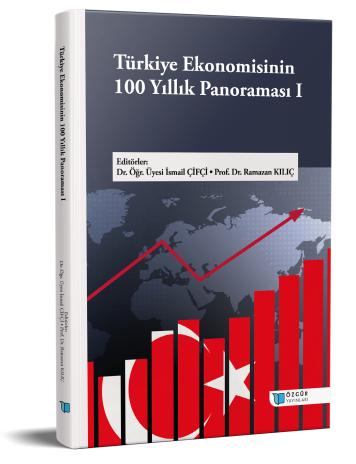
Türkiye Ekonomisinin 100 Yıllık Panoraması I
İndir
Özet
Türkiye Cumhuriyeti, kuruluşundan itibaren geçen yüz yıllık süre içinde, bir ülkenin ekonomik, toplumsal ve kültürel olarak yeniden inşasının eşsiz bir örneği olmuştur. Cumhuriyetin kuruluşundan günümüze kadar geçen yüz yılda, birçok zorluklardan geçilmesine rağmen, Türkiye Cumhuriyeti, zorlukların üstesinden gelme kabiliyetini geliştirerek, kararlı adımlarla ilerlemesini sürdürmüş ve bulunduğu dönemin koşullarına uygun olarak ekonomik büyüme ve kalkınmasını gerçekleştirebilmiştir. Cumhuriyet ilan edilmeden önce, 17 Şubat 1923’de Gazi Mustafa Kemal Atatürk’ün İzmir İktisat Kongresindeki şu ifadeleri ekonomik büyümenin ve kalkınmanın Türkiye için ne kadar hayati olduğunun en açık göstergelerinden birisidir:
“…Yeni Türkiye’mizi layık olduğu yere ulaştırabilmek için mutlaka ekonomimize birinci derecede önem vermek zorundayız. Çünkü; zamanımız tamamen bir ekonomi devresinden başka bir şey değildir… Siyasi, askeri zaferler ne kadar büyük olurlarsa olsunlar, ekonomik zaferlerle taçlandırılmamışlarsa, meydana gelen zaferler devamlı olamaz, az zamanda söner. Bu bakımdan en kuvvetli ve parlak zaferimizin bile sağlayabildiği ve daha sağlayabileceği yararlı kazançları belirlemek için ekonomimizin, iktisadi hakimiyetimizin sağlanması ve sağlamlaştırılması ve genişletilmesi gerekir…”
Birinci Dünya Savaşının ardından yıkılmış bir ekonomi devralan genç Cumhuriyetin ilk hedefi ekonomik büyüme ve kalkınma olmuştur. Türkiye Cumhuriyeti, 1929 Büyük Buhranın küresel etkilerine rağmen sanayileşme ve kalkınma çabalarını kararlılıkla sürdürmüş ve bu dönemde de oldukça başarılı girişimlerde bulunmuştur. İkinci Dünya Savaşının neden olduğu ekonomik baskılar, 1960 ve 1980 askeri darbelerinin ekonomik ve siyasi etkileri, 1973 ve 1979 Petrol Krizi, Kıbrıs Barış Harekâtı gibi ulusal ve uluslararası gelişmeler, 1980’ler sonrası devam eden terör örgütlerinin faaliyetleri, 1990’lı yıllardaki ekonomik ve siyasi istikrarsızlıklar, 1999 Marmara Depremi, 2001 Ekonomik Krizi, 2016’daki hain darbe girişimi, 2020 yılındaki Covid-19 ve nihayet 2023 Kahramanmaraş merkezli depremler gibi çok yönlü olumsuzluklar Türkiye ekonomisini derinden etkilemiş, fakat Türkiye, refah düzeyini sürekli arttırmayı başarmıştır. Yukarıda sıralanan engeller Türkiye’nin tarım toplumundan sanayi toplumuna, sanayi toplumundan da bilgi ekonomisine geçiş sürecini engelleyememiştir. Bu gelişmeler Türkiye’nin ekonomik direnç ve yeteneğini güçlendirerek, birçok alanda yapısal dönüşümünü gerçekleştirmiştir.
Cumhuriyetin ilan edildiği dönemde tarım toplumu niteliğinde olan Türkiye, geçen yüzyıl boyunca üretim yapısını çeşitlendirmiş, sanayileşme yolunda önemli mesafeler kat etmiş ve modern bir ekonomi olma yolunda çok önemli adımlar atmıştır. Türkiye Cumhuriyeti’nin bu dönüşümü, sadece ekonomik göstergelere değil, aynı zamanda sosyal kalkınma, gelir dağılımı ve küresel entegrasyona da yansımıştır. Bu kitap, Türkiye’nin ekonomik hikayesini geniş bir bakış açısıyla ele alarak, Türkiye ekonomisinin dönüşümüne ışık tutmayı amaçlamaktadır. Bu eser, Türkiye Cumhuriyeti’nin ilk yüzyılında elde ettiği ekonomik başarıları ve zorlukları olabildiğince geniş bir bakış açısıyla okuyuculara sunmayı amaçlamakta ve geleceğe yönelik politika belirleyicilerine yol gösterici olmayı hedeflemektedir.
‘Türkiye Ekonomisinin 100 Yıllık Panoraması I’ adlı bu eserin birinci bölümünde, Türkiye’nin 1923-2022 yılları arasındaki ekonomik büyüme performansı ve refah artışı incelenerek dünyanın en büyük 30 ülkesi ile olan ekonomik performansı kıyaslanmıştır. Kitabın ikinci bölümü Cumhuriyetin belli başlı dönemlerine ilişkin sanayileşme sürecine dair kapsamlı bir analiz sunarak, ekonomik yapının hızla değiştiğini ortaya koymaktadır. Üçüncü bölümde, Cumhuriyet’in ilk yıllarından 21. yüzyılın başına kadar yoksulluğun geçirdiği dönüşüm incelenmiştir. Kitabın dördüncü bölümünde, Türkiye’nin yüz yıllık tarihinde enflasyonun seyri dönemler itibarıyla analiz edilmiştir. Beşinci bölümde, Türkiye’nin kamu maliyesindeki dönüşümleri, iç borçlanma stratejileri ve iç borçlanmanın yüz yıllık süreçte nasıl seyrettiği detaylı olarak incelenmiştir. Kitabın altıncı bölümü, gelir dağılımı ile ilgili kavramları ve gelir dağılımını etkileyen iktisadi faktörler açıklayarak, gelir dağılımını etkileyen politikalar dönemler itibariyle incelenmiştir. Yedinci bölüm, Cumhuriyeti’nin kuruluşundan günümüze kadar iş gücü piyasalarındaki dönüşümleri incelemektedir. Kitabın sekizinci bölümünde Türkiye’nin küreselleşme sürecinin siyasi, sosyal ve özellikle ekonomik boyutları incelenmiştir. son olarak dokuzuncu bölümde Türkiye’nin yenilebilir enerji kaynakları incelenerek bunların ekonomik etkileri açıklanmıştır.
Türkiye’nin ikinci yüzyılındaki ekonomik yolculuğu geçmişte olduğu gibi çeşitli zorluklarla karşı karşıya kalabilir. Küresel ekonomik ve siyasi belirsizlikler, iklim değişikliğinin tarım ve enerji sektörüne etkisi, dijital dönüşüm ve yapay zekâ teknolojilerine adaptasyon süreci ve demografik değişimler Türkiye’nin gelecekteki ekonomik büyümesini etkileyecek unsurlardan birkaçıdır. Ayrıca Türkiye ekonomisinin sıklıkla deneyimlediği işsizlik, yüksek enflasyon, gelir eşitsizliği ve dış ticaret açığı gibi yapısal sorunların çözülmesi, sürdürülebilir büyüme ve refah artışı için kritik bir öneme sahiptir. Türkiye, sahip olduğu güçlü ekonomik temeller ve beşerî sermaye sayesinde, yukarıda sıralanan zorlukların üstesinden gelme potansiyeline sahiptir. Türkiye’nin ikinci yüzyılında da sürdürülebilir büyüme stratejilerini benimseyerek küresel ekonomideki rekabet gücünü arttırması ve refah düzeyini daha da yükseltmesi en büyük temennimizdir.
Kitapta emeği geçen tüm yazarlarımıza ve bu çalışmanın hazırlanmasında katkıda bulunan herkese teşekkür eder, bu eserin okuyucularımıza faydalı olmasını dileriz.
Dr. Öğr. Üyesi İsmail ÇİFÇİ - Prof. Dr. Ramazan KILIÇ

